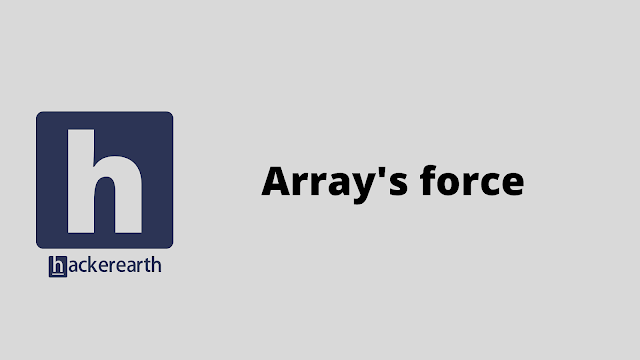In this HackerEarth Array'a force problem solution Let's consider some array A. The following algorithm calculates it's force:
Find all the continuous blocks where all the elemens of A are equal.
Calculate sum of squared lengths of these blocks.
For example if array A = {2, 3, 3, 1, 1, 1, 4, 2, 2} its force will be 12 + 22 + 32 + 12 + 22 = 19
We can reorder some elements and get array with greater force. In the example above we can move the first element of A to the end and get array A = {3, 3, 1, 1, 1, 4, 2, 2, 2} with force 22 + 32 + 12 + 32 = 23.
You are given an array. What is the maximum force you can get by reordering some of its elements?
HackerEarth Array's force problem solution.
#include <cstdio>
#include <algorithm>
#include <vector>
#include <iostream>
#include <string>
#include <string.h>
#include <cmath>
#include <set>
#include <map>
#include <bitset>
#include <iomanip>
#define X first
#define Y second
#define mp make_pair
#define pb push_back
typedef long long ll;
using namespace std;
const int MAXM = 1E6 + 100;
long long c[MAXM];
int n;
int a[MAXM], MOD;
void solve() {
cin>>a[0]>>a[1]>>n>>MOD;
for (int i = 0; i < MOD; i++) {
c[i] = 0;
}
for (int i = 2; i < n; i++) {
a[i] = a[i - 1] + a[i - 2];
a[i] %= MOD;
}
for (int i = 0; i < n; i++) {
//cerr<<a[i]<<" ";
c[ a[i] ]++;
}
//cerr<<endl;
long long ans = 0;
for (int i = 0; i < MOD; i++) {
ans += c[i] * c[i];
}
cout<<ans<<endl;
}
int main() {
int t;
cin>>t;
while (t--) {
solve();
}
return 0;
}
Second solution
#include<iostream>
#include<cstdio>
#include<cstring>
#include<string>
#include<cctype>
#include<cstdlib>
#include<algorithm>
#include<bitset>
#include<vector>
#include<list>
#include<deque>
#include<queue>
#include<map>
#include<set>
#include<stack>
#include<cmath>
#include<sstream>
#include<fstream>
#include<iomanip>
#include<ctime>
#include<complex>
#include<functional>
#include<climits>
#include<cassert>
#include<iterator>
#include<unordered_set>
#include<unordered_map>
using namespace std;
int countt[1000001];
long long int p2[1000002];
namespace test {
void end_test() {
int val;
if (cin >> val) {
exit(1);
}
}
void range_test(int t, int l, int r) {
if (t < l || r < t) {
exit(1);
}
}
}
int main()
{
for(int i=0;i<1000002;i++){
p2[i]=(long long int)(i)*(long long int)(i);
}
int t;
scanf("%d",&t);
test::range_test(t,1,100);
while(t--){
memset(countt,0,sizeof(countt));
int a,b,c,d;
scanf("%d%d%d%d",&a,&b,&c,&d);
test::range_test(a,0,1000000);
test::range_test(b,0,1000000);
test::range_test(c,2,1000000);
test::range_test(d,max(a,b)+1,1000000);
countt[a]++;
countt[b]++;
register int k;
c--;
c--;
while(c--){
k=a+b;
a=b;
b=k;
if(b>=d){
b%=d;
}
countt[b]++;
}
long long int ans=0;
for(int i=1000000;i>=0;i--){
ans+=p2[countt[i]];
}
printf("%lld\n",ans);
}
test::end_test();
return 0;
}



![HackerRank Swap Nodes [Algo] problem solution](https://blogger.googleusercontent.com/img/b/R29vZ2xl/AVvXsEgjGi7Fstz7Lqye8x4O35woHbqY83IFxLWWoAcFKWtcVUFpaHsa36W_s_jsIQw-vD4s-J3t2MfQN6Cn8t0M5JtvDTFX75PloaEQsdzJImQLqzAtA1_z_2ktw9UsJ-Le4MYkHQZrHz3q2-c/w100/hackerrank-interview-preparation-kit-swap-nodes-algo-solution.png)


0 Comments